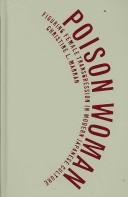| Listing 1 - 2 of 2 |
Sort by
|

ISBN: 9780816647262 0816647267 9780816647279 0816647275 Year: 2007 Publisher: Minneapolis University of Minnesota Press
Abstract | Keywords | Export | Availability | Bookmark
 Loading...
Loading...Choose an application
- Reference Manager
- EndNote
- RefWorks (Direct export to RefWorks)
Based on the lives and crimes of no less than twenty real women, dokufu (poison women) narratives emerged as a powerful presence in Japan during the 1870s. During this tumultuous time, as the nation moved from feudalism to oligarchic government, such accounts articulated the politics and position of underclass women, sexual morality, and female suffrage. Over the next century, the figure of the oversexed female criminal, usually guilty of robbery or murder, became ubiquitous in modern Japanese culture. In Poison Woman, Christine L. Marran investigates this powerful icon, its shifting meanings, and its influence on defining women's sexuality and place in Japan. She begins by considering Meiji gesaku literature, in which female criminality was often medically defined and marginalized as abnormal. She describes the small newspapers (koshinbun) that originally reported on poison women, establishing journalistic and legal conventions for future fiction about them. She examines zange, or confessional narratives, of female and male ex-convicts from the turn of the century, then reveals how medical and psychoanalytical literature of the 1920s and 1930s offered contradictory explanations of the female criminal as an everywoman or a historical victim of social circumstances and the press. She concludes by exploring postwar pulp fiction (kasutori), film and underground theater of the 1970s, and the feminist writer Tomioka Taeko's take on the transgressive woman. Persistent stories about poison women illustrate how a few violent acts by women were transformed into myriad ideological, social, and moral tales that deployed notions of female sexual desire and womanhood. Bringing together literary criticism, the history of science, media theory, and gender and sexuality studies, Poison Woman delves into genre and gender in ways that implicate both in projects of nation-building.
Villains in popular culture --- Women in popular culture --- Women --- Social conditions. --- Japan --- Civilization --- Criminology. Victimology --- Sociology of culture --- Fiction --- Film --- Sexology --- Sociology of the family. Sociology of sexuality --- Mass communications --- J4176.80 --- J4000.70 --- J5500.70 --- J5930 --- Popular culture --- Social conditions --- Japan: Sociology and anthropology -- gender roles, women, feminism -- history --- Japan: Social history, history of civilization -- Kindai (1850s- ), bakumatsu, Meiji, Taishō --- Japan: Literature -- history and criticism -- modern, Kindai (1850s- ), bakumatsu, Meiji, Taishō --- Japan: Literature -- modern fiction and prose (1868- ) --- Public opinion --- Movies --- Literature --- Media --- Sexuality --- Images of women --- Book --- Criminality --- Culture
Book
ISBN: 9781517901592 1517901596 9781517901585 1517901588 1452955727 Year: 2017 Publisher: Minneapolis University of Minnesota Press
Abstract | Keywords | Export | Availability | Bookmark
 Loading...
Loading...Choose an application
- Reference Manager
- EndNote
- RefWorks (Direct export to RefWorks)
"Cultures have long defined themselves through biological elements to prove their strength and longevity, from cherry blossoms in Japan to amber waves of grain in the United States. In Ecology without Culture, Christine L. Marran introduces the concept of biotropes--material and semiotic figures that exist for human perception--to navigate how and why the material world has proven to be such an effective medium for representing culture. A bold and timely reconsideration of ecocriticism, Ecology without Culture insists on decentering questions of culture to highlight the materiality of poetry, film, and prose fiction. Marran argues that ecocriticism can critique ecological realities more effectively from outside the frame of human exceptionalism. Through discussions of primarily non-Anglophone literature, poetry, and cinema about toxic events in contemporary history-- from the depiction of slow violence in documentary by Tsuchimoto Noriaki to the powerful poetry of Ishimure Michiko--Marran argues that ecocriticism must find a way to engage culture without making the perpetuation of ethnos and anthropos the endgame of ecopolitics. Using the biological foundations and geological time scales of textual worlds to more deeply critique cultural humanism, Marran ultimately contends that the chief stumbling block to ecological thinking is not the image of nature, but the image of culture"--
Ecocriticism. --- Ecology in literature. --- Ecology in motion pictures. --- LITERARY CRITICISM --- Asian --- General. --- Ecocriticism --- Ecology in literature --- Ecology in motion pictures --- Motion pictures --- Ecological literary criticism --- Environmental literary criticism --- Criticism
| Listing 1 - 2 of 2 |
Sort by
|

 Search
Search Feedback
Feedback About UniCat
About UniCat  Help
Help News
News